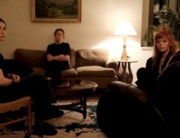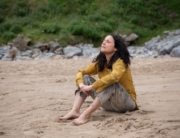This quietly devastating biopic is one of two features based on Christine Chubbuck, a television journalist who in 1974 took her own life during a live news broadcast. Whereas the documentary Kate Plays Christine, also released last year, centered on an actress transforming herself into Chubbuck to experience her final days, director Antonio Campos’s approach is more straightforward. It may lack a mind-bending gimmick, but it boasts a nuanced, three-dimensional portrait of its titular character that appeals to our sense of empathy.
A reporter for a small affiliate station in sleepy Sarasota, Florida, Chubbuck works on segments for a community affairs–centered show, Suncoast Digest. Though highly capable, her work is not particularly valued by her superiors, especially her manager (Tracy Letts). The latter wants to inject more sensationalism into the broadcast, which Chubbuck views as distasteful.
Her professional unhappiness only compounds the other problems in her life. Although she engages in extracurricular activities outside of work, such as putting on puppet shows for a children’s hospital, Chubbuck has neither friends nor a romantic partner. Indeed, her regular social circle consists solely of her mother (J. Smith-Cameron). Meanwhile, at the station, Chubbuck keeps her colleagues at arm’s length, including a junior reporter (Maria Dizzia) who looks up to her and the handsome anchorman (Michael C. Hall) she secretly has feelings for.
The screenplay by Craig Shilowich reveals the cracks in Chubbuck’s façade early on. Alone in her car, she sings a little too longingly to the song playing on the radio. When she experiences a recurring pain around her abdomen, she sees a doctor who asks about her sex life, to which she scoffs a little too tellingly. Hall plays Chubbuck as being in a constant state of longing yet never entirely sure of how to take hold of what she wants.
Over the course of the film, the character begins to spiral down into depression, which gradually becomes a tailspin that can seemingly end in only one way. At times, watching Christine is akin to witnessing a disaster unfold in slow motion. Whereas Kate Plays Christine envisioned Chubbuck as something of a tabula rasa, this film attempts to humanize her as much as possible, and as such, shows her as having an active role in her own downfall. It’s a different interpretation to be sure that also gives it its own identity.
The entire cast is pitch-perfect, especially Hall as the anchorman/main love interest, who appears vapid at the start while simultaneously suggesting there might be more to him than meets the eye. Meanwhile, Letts is wholly believable as a bullying, bottom line-watching boor who is rude to his employees, who naturally despise him in return. This dynamic turns out to be a blessing, since no matter how erratic Chubbuck’s behavior becomes and how often she crosses the lines of professionalism, we never quite feel sorry for him.
Everyone’s efforts, however, would be lost if not for Rebecca Hall’s lived-in portrayal of Chubbuck. Hers is a performance of subtle mannerisms. Although she speaks in a snappy, authoritative way that is instantly believable for an experienced field reporter, she cannot hide away her awkwardness completely. Hall, for example, gives Christine a nervous tic of rubbing one hand with the other, which is frequently visible but not emphasized. In at least one scene, Christine uses eye contact and body language to manipulate her mother emotionally.
Through it all, Campos makes some bold choices, such as framing Chubbuck in a variety of different ways: through the television camera, trailing behind her as she walks away, reflected in multiple mirrors. The implication is that the subject had multiple sides, both public and personal in nature, yet in the end she remains an elusive figure, and tragically so.







Leave A Comment